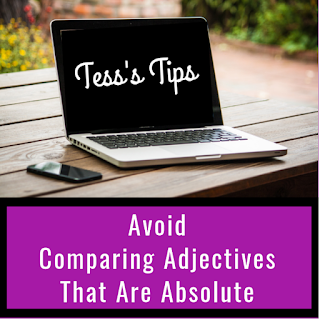Saturday, December 1, 2018
Beware of Creating Sweeping Generalizations
The superlative degree is created by adding est to some words, or adding the word most.
Sweeping Generalization: Terry Bradshaw is the greatest of all quarterbacks in football history.
Saturday, November 10, 2018
Avoid Comparing Adjectives That Are Absolute
This post is a continuation of the tips I discussed in my last post about avoiding errors in adjective and adverb comparisons. Click here if you missed it.
Today, we are going to take a look at adjectives that are absolute in their meaning, and they cannot be compared by using the comparative or superlative degree. Absolute adjectives stand alone.
Usually, when two things are being compared we use the comparative
degree. When more than two things are
being compared, we use the superlative degree. Sometimes, however, the meaning of
an adjective is absolute, and it cannot be compared.
Some examples of absolute adjectives include: absolute, round, straight, square, perfect, and unique.
Incorrect: My score on the exam was more perfect than anyone
else’s.
Correct: My score on the exam was perfect.
Probably the most abused of these words is the adjective unique.
By definition it means there is only one of its kind, so it
cannot be compared to another.
Incorrect: Your story was more unique than mine.
Correct: Your story was unique.
A less frequently used definition of the word unique is unusual. If, when you use the word unique, you mean that something is unusual, it is all right to compare it. It would be better, however, to simply use the word unusual.
For more information on the comparison of adjectives and adverbs, check back here soon. My next post will be tips to help you avoid using sweeping generalizations when making comparisons. A sweeping generalization creates a statement that is too broad.
I hope you are having your best school year ever!
Visit my store for more helpful lessons in grammar and usage. Many of the lessons are free.
Thanks for reading,
Saturday, October 6, 2018
Tips on Using Comparative and Superlative Adjectives and Adverbs
Hopefully, this tip will help you avoid errors when you are using adjectives and adverbs to compare things.
We frequently use adjectives and adverbs to compare two or more things in our writing. When two things are being compared, use the comparative degree. When more than two things are being compared, use the superlative degree.
Some words use er and est to form the comparative and superlative degree.
Some words add the words more and most.
Negative comparisons use the words less and least.
Positive Degree Comparative Degree Superlative Degree
cheap cheaper cheapest
recent more recent most recent
expensive less expensive least expensive
The important thing is never to use both of these comparison words at
the same time. In other words, do not use: er
and more together; or est and most together.
Correct: The older of my two sons is the one you met
yesterday.
Incorrect: The more older of my two sons is the one you met yesterday.
Correct: The healthier you are, the better you look.
Incorrect: The more healthier you are, the better you look.
If you are not sure of the correct spelling when writing a comparison structure, use a dictionary or look up the word online.
In my next post, I will discuss adjectives that are absolute and cannot be compared.
Visit my store for helpful lessons in grammar and usage.
If your students need more help with modifiers, you will find it here.
Thanks for reading,
Wednesday, September 5, 2018
Here's Help with 5 Confusing Words
The
words who's or whose and their, there,
or they’re are
frequently confused and used incorrectly.
Here are some simple tips to help you
use these words correctly.
Their means it belongs to them.
Example: I listen to their music.
There indicates a location.
(Replace it with the similar word “where” to help you remember its meaning.)
Example: I am going there after school.
They’re is a contraction for the words they are.
(Read
a contraction as two words.)
Example:
They’re (They are) my parents.
Whose means it belongs to whom.
Example: Whose coat is this?
Who’s is a contraction for
the words who
is. (Read
a contraction as two words.)
Example: Who’s (Who is) coming with me tonight?
After
you finish writing, search for the words above to be sure you have
chosen correctly.
Ask yourself these questions:
Do you mean “where?” If so, choose “there.”
Do you mean “it
belongs to them?” If so, choose “their.”
Do you mean “they are?” If so, choose “they're.”
Do you mean “who is?” If so, choose “who’s.”
Do you mean it belongs to whom? If so, choose “whose.”
The following sentences are correct:
Whose photos are posted there on the bulletin board? Who's going to write their names on the backs of the photos? They're going to be left of of the yearbook if we don't figure this out.
Click here to buy a set 5 of the task cards your students can use to review the use of these confusing words.
Click here to buy the TASK CARDS BUNDLE and save 20%.
Click here to buy a set 5 of the task cards your students can use to review the use of these confusing words.
Click here to buy the TASK CARDS BUNDLE and save 20%.
* This blog post is updated to reflect the money-saving bundle that is now available.
Subscribe to:
Posts (Atom)











